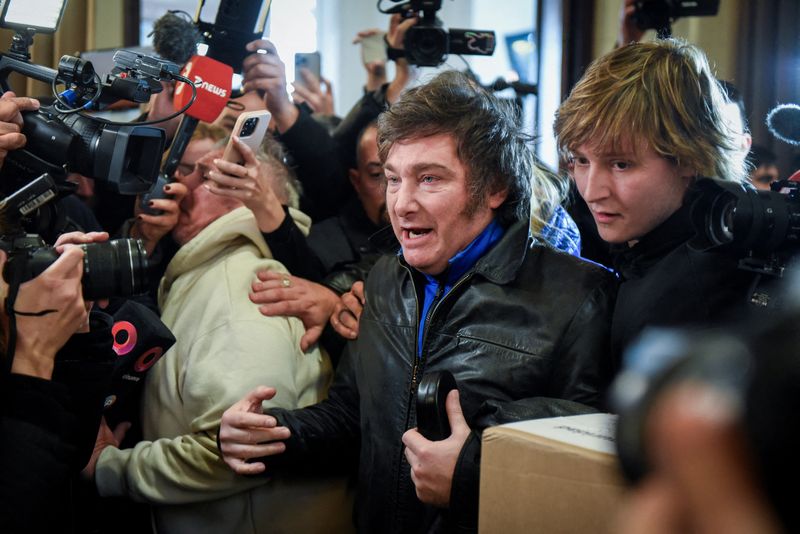By Adam Jourdan, Eliana Raszewski and Anna-Catherine Brigida
BUENOS AIRES (Reuters) -Argentine far-right libertarian Javier Milei shocked the country on Sunday when he won the largest share of the vote in open primary elections. Now the big question is can he repeat the trick in October general elections when it matters?
The primary, which sees all candidates compete against one another, is a good gauge of how the general election will go. Milei won 30% of the vote, just ahead of the main conservative bloc on 28% and the center-left ruling Peronists on 27%.
The firebrand economist, whose boisterous campaign rallies draws comparisons to former U.S. leader Donald Trump, could turn the political status quo on its head in Argentina. He has pledged to shutter the central bank, dollarize the economy and sharply cut state spending.
Milei, however, faces a bigger challenge to win the Oct. 22 general election, or likely a run-off in November, with some voters casting protest votes on Sunday and record low turnout, which dented the more traditional parties.
Those trends could shift in the next two months.
Economy Minister Sergio Massa, the candidate for the governing Peronist coalition, said that the primary vote was just the "first half" of the election competition, using a soccer analogy in the country of greats Lionel Messi and Diego Maradona.
"We have the second half, extra time and then penalties. And we will be fighting until the last minute," he said after the vote, which saw his coalition, the country's top political force for decades, post its worst primary election result.
Analysts said that more people could come out to vote in October after 69.5% turnout in the primary. There is on average a 4 percentage point bump in voter numbers between the primaries and the general election, J.P. Morgan said in a note.
This suggests "higher upside for traditional parties in the general elections as compared to Milei, which we see closer to its ceiling in terms of vote intention".
'MILEI PRESIDENT!'
That potential challenge has done little to dampen spirits in Milei's camp, delighted at far exceeding pollster estimates of around one-fifth of the vote in the primary.
"We can feel it! Milei president!", his fans chanted as the elections results were announced.
The Together for Change conservative coalition pledged to unite behind its elected candidate Patricia Bullrich, a hard-line former security minister, though she said the vote had revealed that people wanted something new.
"This is a society that's demands deep change, down to the roots," she said, promising security, reasonable taxes and ending years of uncertainty and government red tape.
Julio Cobos, a lawmaker with Together for Change, agreed voters had expressed themselves in the polls and were demanding profound change, but the race was still very much open.
"The challenge is the final election which is October," he said, adding the coalition had plenty of room to boost its performance if it stuck together.
"We hope to grow and win in the next elections. It is important that the leaders show up together, unify proposals, speeches, and present as a good team," he said.
Beyond doubt is the fact that the race, previously seen as between the two main parties with Milei a dark horse likely grabbing an notable third place, is now a true three-way fight. Each of the top candidates could make the run-off.
"The election race is now divided in three, which it wasn't before," said Alejandro Corbacho, director of the political science program at Argentine university UCEMA.
"It is clear that there is a lot of anger. People are very angry with the political classes."
Jared Lou, a portfolio manager at William Blair Investment Management, said that Milei had made himself the "front-runner" but there was lots of uncertainty.
"One factor that may help Milei in the presidential elections is that he's an outsider and voters are frustrated," he said. Lou added his views on promoting gun ownership, anti- abortion policies and dollarizing the economy - something most Argentines oppose - could ultimately put off some voters.

A dollar-peso peg introduced in the 1990s brought short-term benefits but ended in an ugly devaluation.
"Many of the policies he has campaigned on are viewed as fairly radical by the electorate."